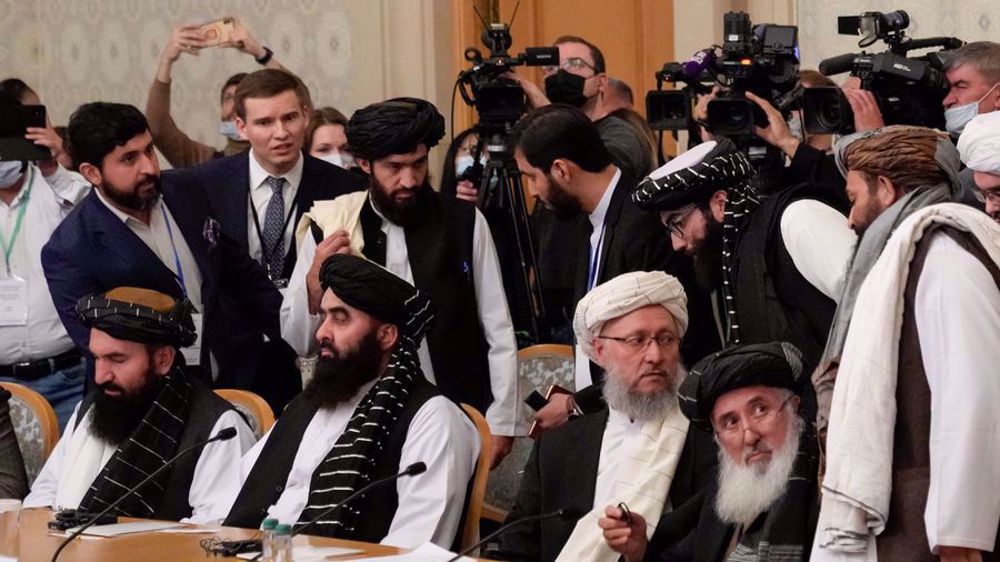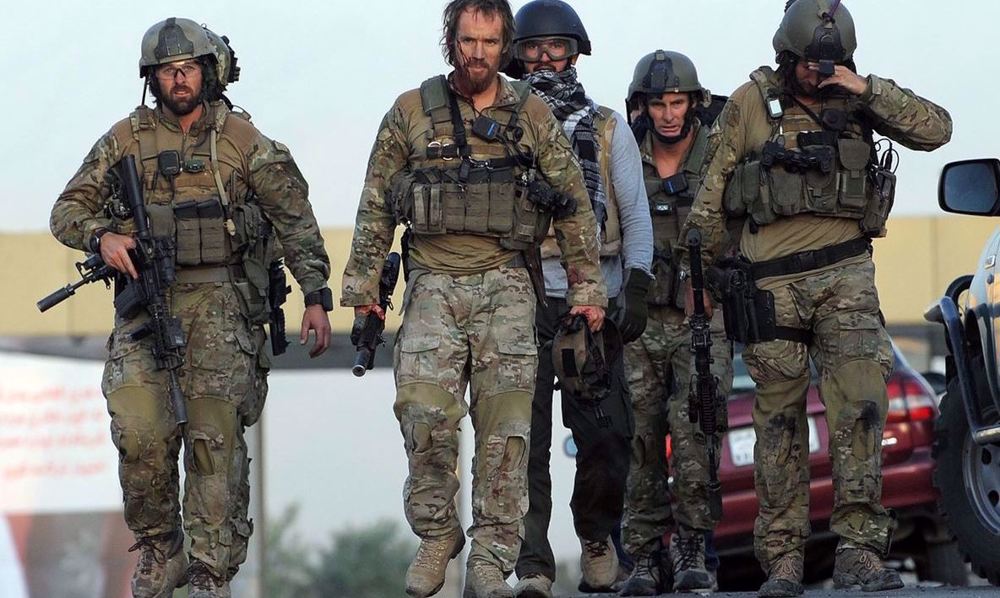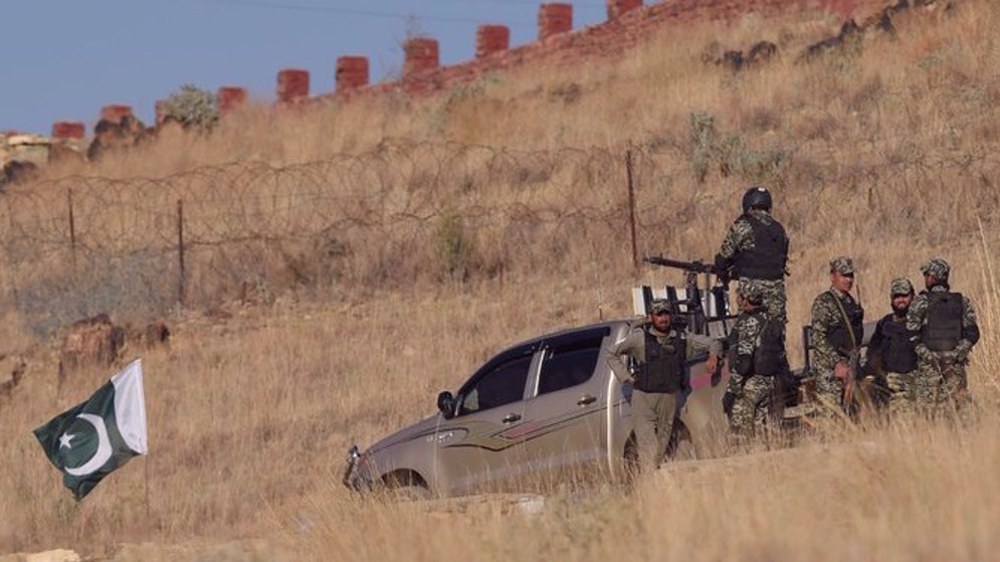Taliban official says failure of Afghan govt. ‘not in interest of anyone’
A Taliban official says the failure of the current government in Afghanistan is “not in the interest of anyone”, almost a year after the group took over the crisis-hit Asian country following a chaotic withdrawal of American forces.
In an exclusive interview with China Global Television Network (CGTN) on Saturday, Taliban Foreign Ministry spokesman Abdul Qahar Balkhi sounded the alert, stressing that there is no alternative to the current Taliban-led government in sanctions-hit Afghanistan.
“It is a golden opportunity not only for Afghans to bring prosperity, security, and well-being to our nation but also for the international community to finally have this burden that has been on its shoulders for 43 years [lifted] and to let the Afghans function as a normal state and as a normal people,” Balkhi said.
The Taliban managed to storm back to power in mid-August 2021 after making sweeping advances across Afghanistan in the midst of a messy withdrawal of US-led foreign forces as well as the rapid collapse of the country's security forces.
The group announced the formation of a caretaker government in September, but their efforts to stabilize the situation have so far been undermined by international sanctions, as banks are running out of cash and civil servants are going unpaid.
No country has yet recognized the Taliban government and their rule over Afghanistan. Since their takeover, the Taliban have been struggling to contain a deepening economic crisis.
"It is not in the interest of anyone" for Afghanistan's government to fail says Abdul Qahar Balkhi, spokesperson for the Ministry of Foreign Affairs of the Islamic Emirate of Afghanistan says in an interview with CGTN's reporter Sean Callebs. #CGTNNews pic.twitter.com/MWybklXwko
— CGTN America (@cgtnamerica) July 23, 2022
The Taliban initially made vague promises regarding women's rights in Afghanistan, pledging to rule differently compared to their first stint in power, when girls and women were banned from education.
However, ever since they strengthened their rule across the country, the Taliban have been strongly criticized for imposing new restrictions on women, including on their dress code in public and their education.
Balkhi said there are some societal constraints within Afghanistan in terms of the culture and tradition that cannot change overnight, explaining that women are allowed to work and that 94,000 women are working in the education sector, 4,000 of which are in the higher education sector and 14,000 in the health sector.
‘Why do we have to be a carbon copy of the US?’
The spokesman pointed out that women from certain tribes around the world, including in Africa and the Amazon, had different cultures, some of whom “did not wear clothes.”
“No one has any problems with how they operate. Yet when it comes to Afghanistan, there is a focus on the dress code. Why am I not allowed to dress the way I want to dress, the way my woman wants to dress? Why do we have to be a copy, carbon copy of the United States?” Balkhi said.
"This is not exclusive to Afghanistan.. there is documented evidence that this takes place in the United States." Abdul Qahar Balkhi, spokesperson for the Ministry of Foreign Affairs of the Islamic Emirate of Afghanistan says in interview. #CGTNNews #Afghanistan pic.twitter.com/7Emc1OJnIh
— CGTN America (@cgtnamerica) July 23, 2022
When asked about women’s protest against restrictions and videos showing that they were beaten by Taliban security forces during the demonstrations, the Taliban official said such protests are not unique to Afghanistan and in almost all courtiers, including the US, one can witness such demonstrations against certain issues.
“This is not exclusive to Afghanistan. There is documented evidence that this takes place in the United States,” Balkhi said, stressing that some protesting women, with certain agendas, were not coordinating with authorities.
“When the people try to provoke the security and to cooperate when they are told to do something, the security forces engage in something they shouldn’t. But the circumstances are such that they are forced to engage and physically push back those who try to provoke. This is not exclusive to Afghanistan,” the Taliban official said.
‘World should not forget Afghanistan’
Meanwhile, the Taliban’s acting Minister of Energy and Water Mullah Abdul-Latif Mansour urged the international community to participate in Afghanistan's infrastructure rebuilding through funding projects and freeing the frozen assets.
His remarks come as US-led sanctions on Afghan government bodies and banks have cut off most direct assistance. The Taliban have urged Washington to unfreeze Afghanistan's assets, particularly after a devastating earthquake last month.
“We call on the international community to help us resume our infrastructural projects by releasing our assets and lifting sanctions. This is a clear cruelty when the West seizes our assets after years of invasion, war, and destruction,” he said at a press conference in the capital Kabul on Saturday.
“There is a severe drought in our country which is adding to the misery of the people of Afghanistan,” Mansour added.
He also said with the global sanctions in place, Afghan traders and the industrial sector were facing multiple problems and difficulties. "The world countries should not forget Afghanistan."
Hamas thanks Iran, Resistance Front following achievement of ceasefire in Gaza
'Capitulation': Israeli officials and media concede Gaza defeat as truce unfolds
'Gaza has won': Social media users react to ceasefire with mix of relief, joy
Iran seeks South Korea’s assistance for AI, fiber-optic projects
VIDEO | Iran's 'Eqtedar' (Power) maneuver
Israel hits HTS military target in Syria for 1st time since fall of Assad
VIDEO | Press TV's news headlines
Israel has slaughtered 13,000 students in Gaza, West Bank











 This makes it easy to access the Press TV website
This makes it easy to access the Press TV website